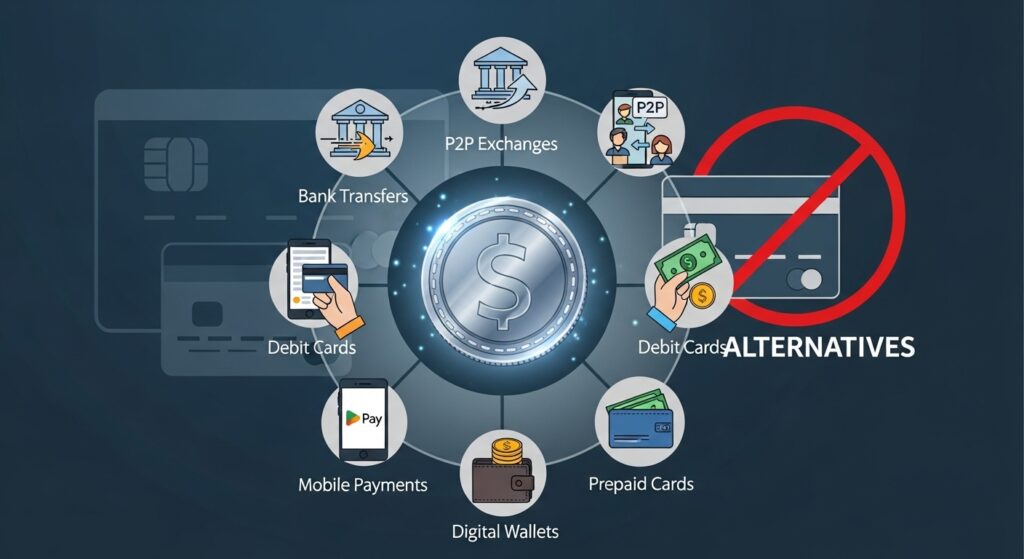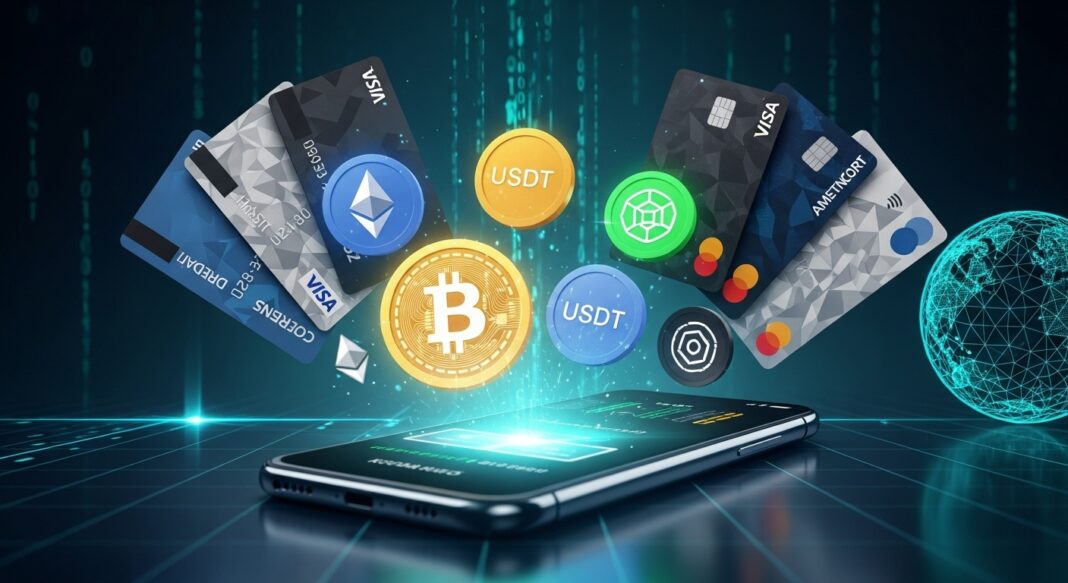Cryptocurrency is becoming a popular way to invest and make transactions. Many people want to use their credit cards to buy crypto because it’s convenient. However, not all credit cards allow crypto purchases, and those that do often come with high fees. This overview explains which credit cards allow crypto purchases, the costs involved, and safer alternatives. We’ll also provide a step-by-step guide to help you get started.
Understanding Crypto Purchases with Credit Cards
When you buy crypto with a credit card, you’re using borrowed money. This is different from a debit card, where you use your own funds. Credit cards may offer rewards or buyer protections, but these often don’t apply to crypto purchases. Many banks treat crypto transactions as cash advances, which means higher fees and interest rates. Understanding these differences is key before you decide to use a credit card.
Top Credit Cards for Buying Cryptocurrency
Most major banks, like Wells Fargo, Citibank, and Bank of America, do not allow crypto purchases with their credit cards. However, some cards are designed for crypto users. Here are a few options:
- Gemini Credit Card: Earn rewards in over 50 cryptocurrencies on every purchase. It’s widely available in the U.S. and managed by the Gemini exchange. Learn more.
- BlockFi Rewards Visa Signature Card: Offers 1.5% back in Bitcoin on all purchases. It’s a good choice for those who want to grow their crypto holdings. Learn more.
- SoFi Credit Card: Some users report success using this card for crypto purchases, but it’s not guaranteed. Check with SoFi before trying.
While Visa and Mastercard technically allow crypto purchases, the issuing bank has the final say. Some credit unions or smaller banks may permit crypto transactions, but policies can change, so always confirm with your bank.
Best Crypto Exchanges That Accept Credit Cards

To buy crypto with a credit card, you need an exchange that accepts them. Here are some popular options:
| Exchange | Accepted Cards | Notes |
|---|---|---|
| BitMart | Visa, Mastercard | Widely available, but fees may apply. |
| Crypto.com | Visa, Mastercard | Competitive fees, supports Canadian users with Interac e-Transfer. |
| Kraken | Visa, Mastercard | Regional restrictions may apply. |
| Coinmama | Visa, Mastercard | Higher fees compared to other exchanges. |
Note that Coinbase no longer allows new credit card links for purchases. If you already have a card linked, you may still use it, but new users must use debit cards or bank transfers. Learn more. Always check the exchange’s payment policies and your bank’s rules before proceeding.
Understanding the Fees of Buying Crypto with Credit Cards
Buying crypto with a credit card can be costly. Here’s a breakdown of the fees you might face:
- Cash Advance Fees: Most banks treat crypto purchases as cash advances, charging 3-5% per transaction. For a $1,000 purchase, that’s $30-$50 in fees.
- Higher Interest Rates: Cash advances have higher interest rates than regular purchases, often starting immediately with no grace period.
- Exchange Fees: Crypto exchanges may charge 1-5% for credit card transactions. For example, Coinmama charges up to 5% on top of a 3.9% commission. Learn more.
These fees can add up. A $1,000 crypto purchase might cost $60-$100 in fees, reducing your investment’s value.
Risks and Downsides of Using Credit Cards for Crypto
Using a credit card for crypto purchases comes with risks:
- Price Volatility: Cryptocurrency prices can drop suddenly. If you buy with a credit card and the price falls, you could owe more than the crypto is worth.
- High-Interest Debt: If you don’t pay off your credit card balance in full, you’ll face high interest rates on the cash advance, which can lead to significant debt.
- Regulatory Changes: Banks and exchanges can change their policies, potentially blocking future crypto purchases with your card.
Many experts advise against using credit cards for crypto due to these risks. See Forbes for details.
Alternatives to Credit Cards for Purchasing Crypto

To avoid high fees and risks for your investment in crypto, consider these alternatives:
- Debit Cards: Use your own money, avoiding debt and high interest. Most exchanges accept debit cards with lower fees than credit cards.
- Bank Transfers (ACH): Transfer money directly from your bank account. This is often the cheapest option, with fees as low as 1%. Learn more.
- Peer-to-Peer Platforms: Platforms like LocalBitcoins let you buy crypto directly from other users, often with lower fees.
These methods are safer and more cost-effective for most crypto buyers.
Step-by-Step Guide to Buying Crypto with a Credit Card
If you decide to use a credit card, follow these steps:
- Verify with Your Bank: Call your bank to confirm they allow crypto purchases. Many major banks don’t.
- Choose an Exchange: Select a platform like BitMart or Crypto.com that accepts credit cards.
- Link Your Card: Follow the exchange’s instructions to add your credit card to your account.
- Make the Purchase: Enter the amount of crypto you want to buy and complete the transaction.
- Check Your Statement: Monitor your credit card statement for fees and ensure the transaction is correct.
Conclusion: Is Buying Crypto with a Credit Card Worth It?
Buying crypto with a credit card is possible but often not the best choice. High fees, interest rates, and risks like price volatility make it expensive and risky. Debit cards or bank transfers are usually better options. If you want crypto rewards, consider cards like the Gemini Credit Card or BlockFi Rewards Visa Signature Card. Always check with your bank and exchange to avoid unexpected issues.
Frequently Asked Questions (FAQs)
- Can I buy crypto with any credit card?
No, many major banks block crypto purchases. Crypto-friendly cards like Gemini or BlockFi are better options. - What are the best credit cards for buying crypto?
The Gemini Credit Card and BlockFi Rewards Visa Signature Card are popular for their crypto rewards. - Why do some banks not allow crypto purchases?
Banks see crypto as risky due to price volatility and lack of regulation, so they block transactions to protect customers. - Are there benefits to using a credit card for crypto?
Some cards offer crypto rewards, but high fees and interest often outweigh these benefits.

